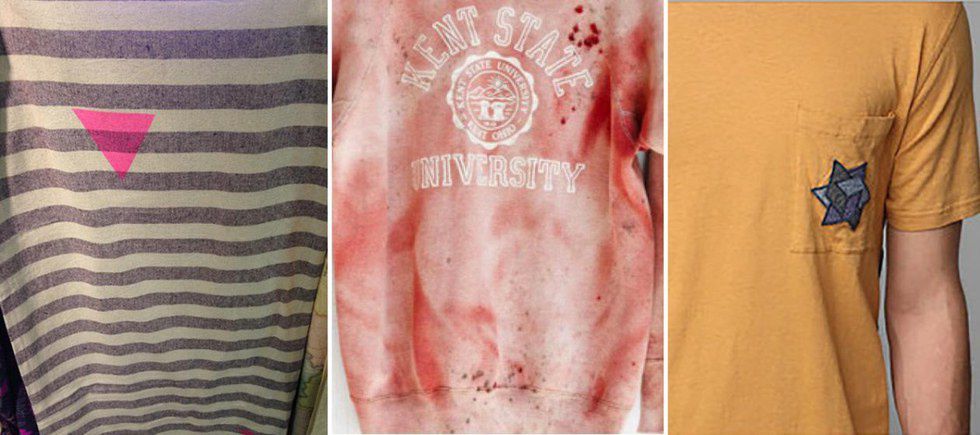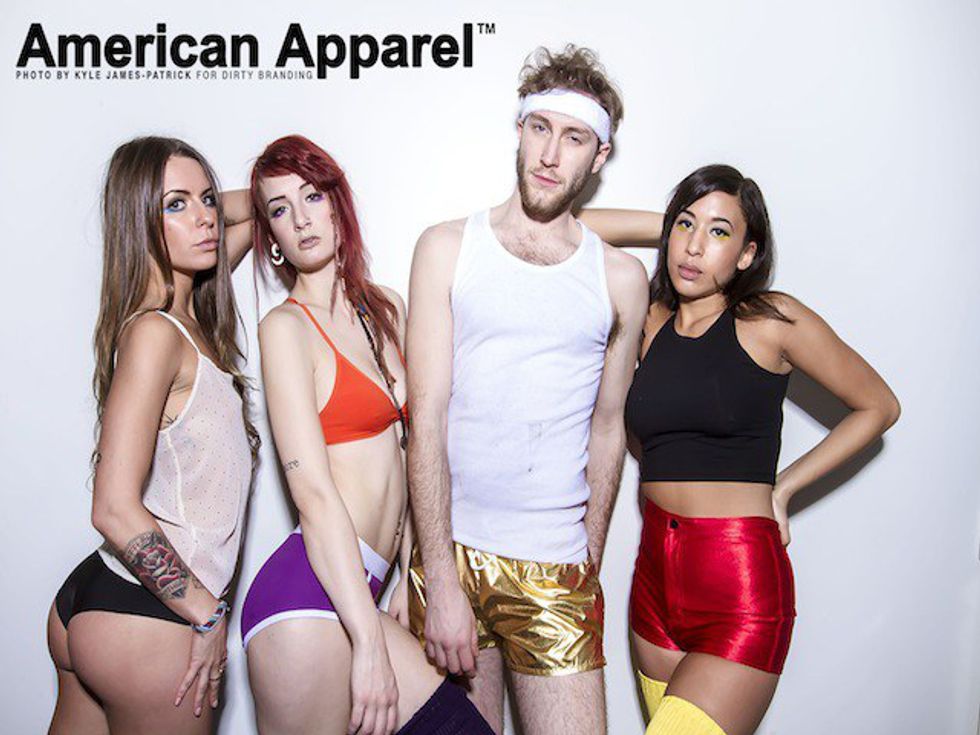To say that fashion helps dictate the norms of society would be an understatement. Major corporations know they hold a powerful influence, especially over the minds of young adults. So why do so many companies continue to sell clothing featuring offensive or sensitive material? And how do they still manage to thrive?
The most infamous—but by no means the only—perpetrators of controversy are Urban Outfitters and American Apparel. Since 2003, UO has sparked outrage from just about everyone for its continuous production of offensive material. These products include a tapestry with a design similar to the clothing gay men wore in Nazi concentration camps, a bloody Kent State sweater, and a shirt with a star eerily similar to the Jewish star. And those are just a few of the items that have drawn ire.
(Photo credit: The Week)
American Apparel has faced controversy for both their clothing and company ethics. The women who model for them are objectified to no end (warning: the images are NSFW), regardless of what they're wearing. One of their most controversial moments involved their "Back to School" campaign, featuring both men and women in suggestive photoshoots, which some claimed to promote a sexual connotation of school to the company's impressionable audience. Their ads have even been banned for their overt sexualization.
(Photo credit: American Apparel)
And those are only a few of the controversies the two companies have been called out for. But these controversies haven't passed without consequences. Urban Outfitters has been facing stock drops in recent months, a continuing trend over the past few years. American Apparel is filing for bankruptcy for the second time since last year.
So are these companies still popular amongst young adults?
In high school, you could move up the ladder of popularity by simply shopping at UO and AA. And just about everyone seemed to do so, regardless of their style. One of my friends had an almost religious devotion to them—even an off-handed joke about the stores landed me in hot water. But I was especially appalled at the fact that people knew about the controversies and continued to shop there. That is, until I stumbled upon a similarity that the stores shared:
Both Urban Outfitters and American Apparel profit from pain.
Why? Controversy sells. How? Well, odds are that you've heard of UO and AA's controversies on the news. Now you're curious about the companies and might look them up. Once they remove the controversial item or ad, you might have enough forgiveness in your heart to buy that cute but overpriced t-shirt from them. Or you found the controversial item entertaining and bought it for shock value. Or maybe you subscribe to hipster culture.
But "hipster culture became more about a particular ethical lifestyle", according to an article by Elizabeth Segran. The current wave of hipsters now tend to follow a lifestyle of continuous ethical learning rather than simply rejecting mainstream culture. Both UO and AA only cater to the last wave hipsters who reject mainstream culture.
There's no one reason why UO and AA continue to produce controversial products, nor why they refuse to conform to the wants of modern hipsters. But that's besides the point. If UO and AA can stand after their heinous controversies, they're setting a precedent for other companies. Every corporation has its fair share of controversy, but UO and AA seem to encourage a capitalist ideal where they cannot be touched as long as they're making a profit. No matter how many modern hipsters shun them, they cannot die. Even in bankruptcy their stores are a common sight in major cities across the U.S. The want of the consumer is no longer an influence on either company's branding.
This is a dangerous idea for a company to retain. Not only does it seem to doom the company from an economic standpoint, but it encourages a society that runs on insensitivity. Where is our humanity if we cannot sympathize with the painful realities other face? And where is our humanity if we cannot be respectful at the very least? Sympathy and respect are key components to any stable society. No person group should feel exploited, insulted, or triggered on a regular basis because of society's norms.
And right now? Profiteering pain is a norm. UO and AA are the main contributors to this toxic culture. Unless we hold our companies up to higher standards, they'll continue to let us down.









 mr and mrs potato head
StableDiffusion
mr and mrs potato head
StableDiffusion










